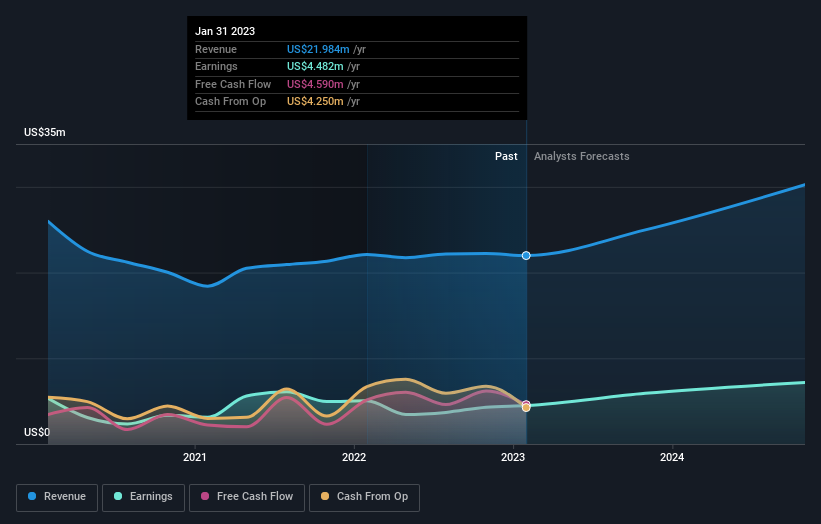With 46% ownership in Coda Octopus Group, Inc. (NASDAQ:CODA), insiders continue to have the largest holding even though they have sold shares recently
Key Insights
Significant insider control over Coda Octopus Group implies vested interests in company growth
53% of the business is held by the top 6 shareholders
If you want to know who really controls Coda Octopus Group, Inc. (NASDAQ:CODA), then you'll have to look at the makeup of its share registry. And the group that holds the biggest piece of the pie are individual insiders with 46% ownership. In other words, the group stands to gain the most (or lose the most) from their investment into the company.
Even though insiders have sold shares recently, the group owns the most numbers of shares in the company.
In the chart below, we zoom in on the different ownership groups of Coda Octopus Group.
See our latest analysis for Coda Octopus Group
What Does The Institutional Ownership Tell Us About Coda Octopus Group?
Many institutions measure their performance against an index that approximates the local market. So they usually pay more attention to companies that are included in major indices.
As you can see, institutional investors have a fair amount of stake in Coda Octopus Group. This can indicate that the company has a certain degree of credibility in the investment community. However, it is best to be wary of relying on the supposed validation that comes with institutional investors. They too, get it wrong sometimes. When multiple institutions own a stock, there's always a risk that they are in a 'crowded trade'. When such a trade goes wrong, multiple parties may compete to sell stock fast. This risk is higher in a company without a history of growth. You can see Coda Octopus Group's historic earnings and revenue below, but keep in mind there's always more to the story.
Coda Octopus Group is not owned by hedge funds. Our data shows that Niels Sondergaard is the largest shareholder with 20% of shares outstanding. Bryan Ezralow is the second largest shareholder owning 9.7% of common stock, and Tyler Runnels holds about 7.8% of the company stock. Tyler Runnels, who is the third-largest shareholder, also happens to hold the title of Member of the Board of Directors. Additionally, the company's CEO Annmarie Gayle directly holds 0.6% of the total shares outstanding.
We also observed that the top 6 shareholders account for more than half of the share register, with a few smaller shareholders to balance the interests of the larger ones to a certain extent.
While studying institutional ownership for a company can add value to your research, it is also a good practice to research analyst recommendations to get a deeper understand of a stock's expected performance. There is some analyst coverage of the stock, but it could still become more well known, with time.
Insider Ownership Of Coda Octopus Group
While the precise definition of an insider can be subjective, almost everyone considers board members to be insiders. Company management run the business, but the CEO will answer to the board, even if he or she is a member of it.
Most consider insider ownership a positive because it can indicate the board is well aligned with other shareholders. However, on some occasions too much power is concentrated within this group.
It seems insiders own a significant proportion of Coda Octopus Group, Inc.. It has a market capitalization of just US$111m, and insiders have US$51m worth of shares in their own names. It is great to see insiders so invested in the business. It might be worth checking if those insiders have been buying recently.
General Public Ownership
With a 25% ownership, the general public, mostly comprising of individual investors, have some degree of sway over Coda Octopus Group. While this size of ownership may not be enough to sway a policy decision in their favour, they can still make a collective impact on company policies.
Private Company Ownership
It seems that Private Companies own 3.5%, of the Coda Octopus Group stock. It's hard to draw any conclusions from this fact alone, so its worth looking into who owns those private companies. Sometimes insiders or other related parties have an interest in shares in a public company through a separate private company.
Next Steps:
While it is well worth considering the different groups that own a company, there are other factors that are even more important. Take risks for example - Coda Octopus Group has 1 warning sign we think you should be aware of.
If you are like me, you may want to think about whether this company will grow or shrink. Luckily, you can check this free report showing analyst forecasts for its future.
NB: Figures in this article are calculated using data from the last twelve months, which refer to the 12-month period ending on the last date of the month the financial statement is dated. This may not be consistent with full year annual report figures.
Have feedback on this article? Concerned about the content? Get in touch with us directly. Alternatively, email editorial-team (at) simplywallst.com.
This article by Simply Wall St is general in nature. We provide commentary based on historical data and analyst forecasts only using an unbiased methodology and our articles are not intended to be financial advice. It does not constitute a recommendation to buy or sell any stock, and does not take account of your objectives, or your financial situation. We aim to bring you long-term focused analysis driven by fundamental data. Note that our analysis may not factor in the latest price-sensitive company announcements or qualitative material. Simply Wall St has no position in any stocks mentioned.
Join A Paid User Research Session
You’ll receive a US$30 Amazon Gift card for 1 hour of your time while helping us build better investing tools for the individual investors like yourself. Sign up here


